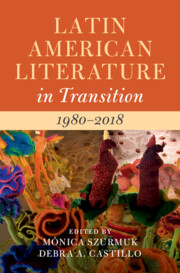Book contents
- Latin American Literature in Transition 1980–2018
- Latin American Literature in Transition
- Latin American Literature in Transition 1980–2018
- Copyright page
- Contents
- Contributors
- Acknowledgments
- Introduction
- Part I Security
- Part II New Genres
- Part III Mobilities
- Chapter 12 New Latinx/Chicanx Thought
- Chapter 13 The Boundless Dramas of Dancing Mulatas
- Chapter 14 Contemporary Stories of Deportation and Migration
- Chapter 15 The Language Shift of Literary Studies on Abiayala
- Chapter 16 South Asia and Latin America/Comparative Booms
- Part IV Positionalities
- Part V Latin American Literature in Global Markets
- Index
- References
Chapter 13 - The Boundless Dramas of Dancing Mulatas
from Part III - Mobilities
Published online by Cambridge University Press: 24 November 2022
- Latin American Literature in Transition 1980–2018
- Latin American Literature in Transition
- Latin American Literature in Transition 1980–2018
- Copyright page
- Contents
- Contributors
- Acknowledgments
- Introduction
- Part I Security
- Part II New Genres
- Part III Mobilities
- Chapter 12 New Latinx/Chicanx Thought
- Chapter 13 The Boundless Dramas of Dancing Mulatas
- Chapter 14 Contemporary Stories of Deportation and Migration
- Chapter 15 The Language Shift of Literary Studies on Abiayala
- Chapter 16 South Asia and Latin America/Comparative Booms
- Part IV Positionalities
- Part V Latin American Literature in Global Markets
- Index
- References
Summary
When Mônica Santana’s solo performance Isto Não É Uma Mulata (2015) premiered at Casa Escafandro in Salvador Bahia, the poet/playwright/performer led her audience through a multilingual interrogation of the mulata trope, denouncing Brazil’s literary canon and founding narratives of mestiçagem while claiming agency over the terms of how and when the mulata’s body would be put to work. Calling on a trans-hemispheric sisterhood of feminist icons of the Black diaspora from Queen Latifah to MC Carol, Santana’s Isto Não É Uma Mulata exemplifies the type of cultural nation-making that is forged in the shared consciousness of the Black Atlantic. This essay opens Santana’s play to a comparative reading of sex-radical feminist performances enacted by mulatas of popular music and culture, examining the political openings that are seized when Black women work their bodies in the interest of protest. Santana performs in tune with artists such as Brazil’s infamous funkeira MC Carol, manipulating her spectator’s disdain for satirical crudeness and boundless sexuality in order to infuse pointed social commentary with tracks such as “Não Foi Cabral” and her collaborative manifesto with Karol Conká, “100% Feminista.”
- Type
- Chapter
- Information
- Latin American Literature in Transition 1980–2018 , pp. 200 - 214Publisher: Cambridge University PressPrint publication year: 2022

